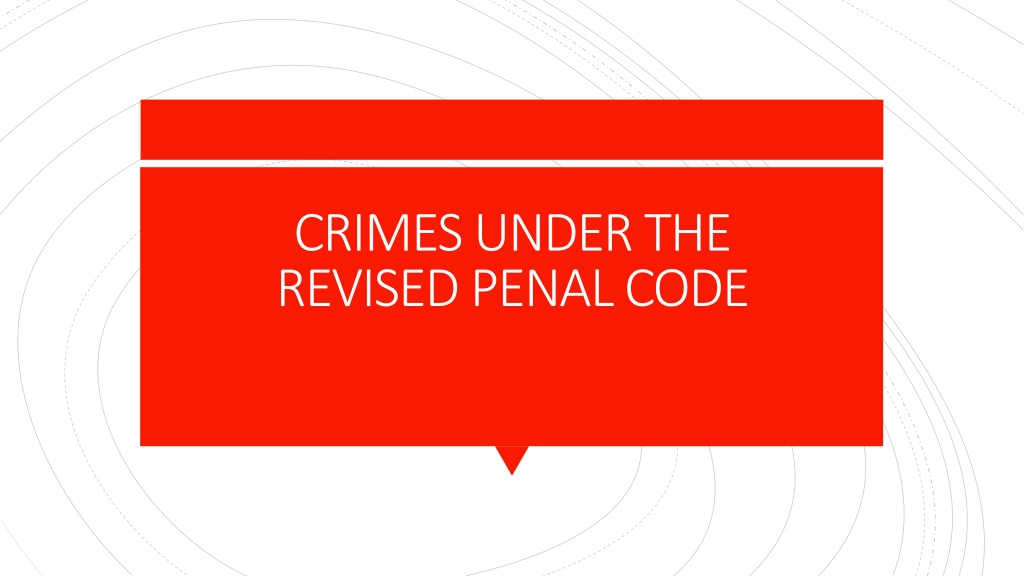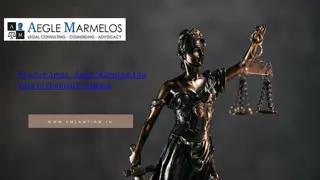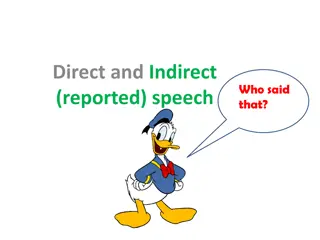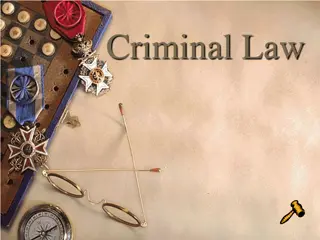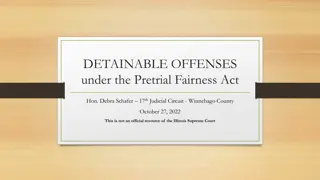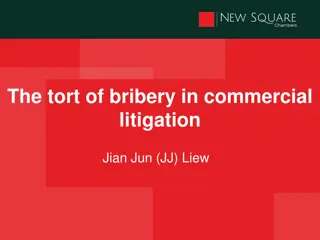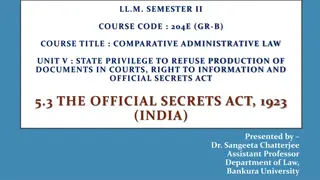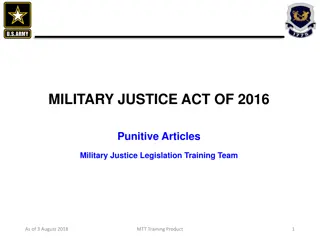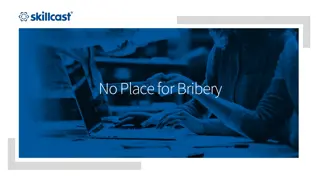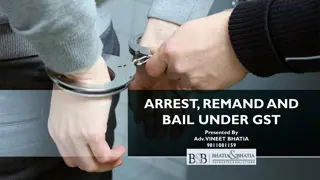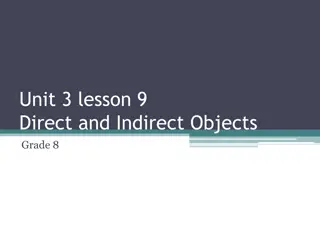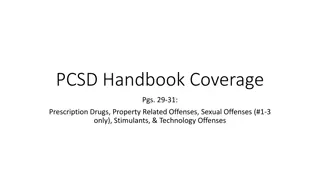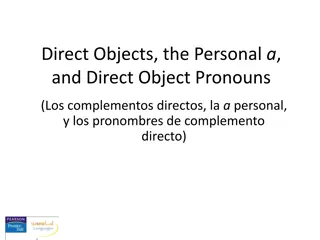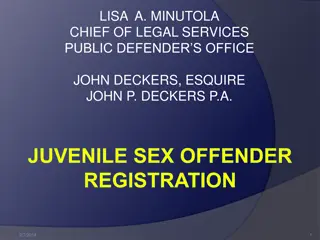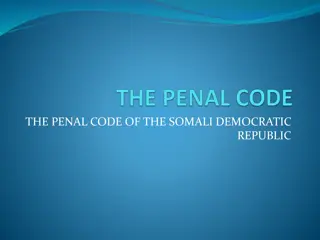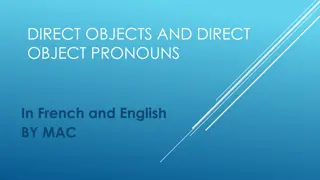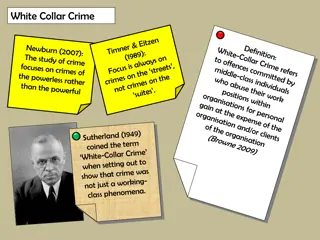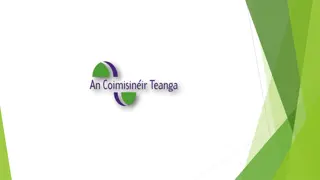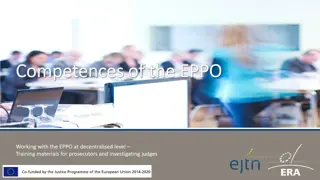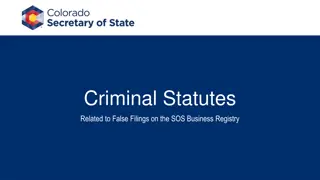Direct Bribery and Public Official Offenses
Bribery of public officials under the Revised Penal Code, specifically Articles 210 to 212, involves direct, indirect, and qualified bribery. Direct bribery encompasses acts where a public officer agrees to perform or abstain from acts in exchange for gifts, promises, or considerations. Offenses involve public officers accepting gifts with intent to commit a crime or unjust acts related to their duties. The elements and instances of bribery are detailed, emphasizing the involvement of public officials and private individuals.
Download Presentation

Please find below an Image/Link to download the presentation.
The content on the website is provided AS IS for your information and personal use only. It may not be sold, licensed, or shared on other websites without obtaining consent from the author.If you encounter any issues during the download, it is possible that the publisher has removed the file from their server.
You are allowed to download the files provided on this website for personal or commercial use, subject to the condition that they are used lawfully. All files are the property of their respective owners.
The content on the website is provided AS IS for your information and personal use only. It may not be sold, licensed, or shared on other websites without obtaining consent from the author.
E N D
Presentation Transcript
CRIMES UNDER THE REVISED PENAL CODE
Any person who, by direct provision of the law, popular appointment by competent authority, shall take part in the performance of public functions in the Government of the Philippine islands, or shall perform in said Government or in any of its branches public duties as an employee, agent, or subordinate official,of any rank or class. election or PUBLIC OFFICERS
Bribery of public officials is penalized under Articles 210 to 212 of the Revised Penal Code The penalizes 3 kinds of bribery: A.direct bribery; B.indirect bribery;and C.qualified bribery. Revised Penal Code BRIBERY
A public officer commits direct bribery 1. By agreeing to perform, or by performing, in consideration of any offer, promise, gift or present an act constituting connection with the performance of his official duties. a crime, in ACTS PUNISHABLE IN DIRECT BRIBERY 2. By accepting a gift in consideration of the execution of an act which does not constitute a crime, in connection with the performance of his official duty. 3. By agreeing to refrain, or by refraining, from doing something which it is his official duty to do, in consideration of gift or promise.
a) That the offender be a public officer within the scope of Article 203. b) That the offender accepts an offer or a promise or receives a gift or present by himself or through another. c) That such offer or promise be accepted, or gift or present received by the public officer 1. with the view to committing some crime;or 2. in consideration of the execution of an act which does not constitute a crime, but the act must be unjust;or 3. To refrain from doing something which it is his official duty to do. d) That the act which the offender agrees to perform or which he executes be connected with the performance of his official duties. ELEMENTS OF DIRECT BRIBERY
Bribery exists,not only (1) when the gift is offered voluntarily by a private person, or (2) when the gift is solicited by a public officer and the private person voluntarily delivers it to the public officer, but also (3) when the gift is solicited by a public officer, as the consideration for his refraining from the performance of an official duty and the private person gives the gift for fear of the consequences which would result if the officer performs his functions. (December Supreme Court of Spain, cited in People v. Sope, 75 Phil.810) GIFT IS EITHER (1) VOLUNTARILY OFFERED BY A PRIVATE PERSON, OR (2) SOLICITED BY A PUBLIC OFFICER of November 3, 1879,
In case there is only an offer of gift or a promise to give something, the offer or the promise must be accepted by the public officer. THE OFFER OF GIFT OR PROMISE MUST BE ACCEPTED BY THE PUBLIC OFFICER If the offer is not accepted by the public officer,only the person offering the gift or present is criminally liable for attempted corruption of public officer under Article 212 in relation to Article 6. The public officer is not liable.
It is sufficient that a promise or offer was made to the public officer to give him money if he would commit an unlawful act in connection with the performance duties and that he agreed to commit the unlawful act in consideration of the promise or offer. A PROMISE TO GIVE GIFT TO, AND A PROMISE TO COMMIT AN UNLAWFUL ACT BY A PUBLIC OFFICER WILL BE SUFFICIENT IN DIRECT BRIBERY UNDER THE FIRST PAR. OF ART. 210 of his official
MANNER OF COMMISSION With a view to committing a crime PENALTIES PENALTIES FOR THE FIRST FORM OF DIRECT BRIBERY Prision mayor in its medium and maximum periods (8 years and imprisonment);and 1 day to 12 years Fine of not less than three (3) times the value of the gift;and The penalty corresponding to the crime agreed upon,if the crime shall have been committed Special temporary disqualification
EXAMPLE: The accepted a promise of P1000 from an individual and promised to alter the notes taken by him during the trial of a case. The act which the stenographer promised to do would constitute the crime of falsification under Article 171 of the Code. stenographer of the court A PROMISE TO GIVE GIFT TO, AND A PROMISE TO COMMIT AN UNLAWFUL ACT BY A PUBLIC OFFICER WILL BE SUFFICIENT IN DIRECT BRIBERY UNDER THE FIRST PAR. OF ART. 210
Thus, if the stenographer of the court who had accepted a promise of P1000 from an individual altered the notes in accordance with the agreement, he addition to corresponding to bribery,the penalty for the crime of falsification by a public officer or employee under Article 171 of the Code. THE PUBLIC OFFICER TO SUFFER THE PENALTY CORRESPONDING TO THE CRIME AGREED UPON, IF THE SAME SHALL HAVE BEEN COMMITTED. shall the the suffer, penalty crime in of
EXAMPLE: A Municipal President who ordered the release of a prisoner upon receiving from the latter the sum of P20, instead of obeying the orders of the provincial governor requiring him to send the prisoner to the provincial capital, is guilty of direct bribery, because, having the prisoner under his charge, it was part of his official duty to obey the orders of the provincial governor in this respect. (U.S. v.Valdehueza,4 Phil.470). THE ACT WHICH THE PUBLIC OFFICER AGREES TO PERFORM MUST BE CONNECTED WITH THE PERFORMANCE OF OFFICIAL DUTIES
In the case of U.S. v. Gacutan, 28 Phil. 100, the bribery committed by the justice of the peace falls under this form of bribery, because when he decided the case in favor of the party who gave him a female carabao worth P80, without regard to the evidence, he executed an act which is not criminal, for there was no evidence that the decision was unjust and that he knew it to be unjust.The act he executed was unjust,for it certainly was an act of injustice to convict a person charged with a crime without regard to what the evidence in the case may be. EXAMPLE OF SECOND FORM OF DIRECT BRIBERY
MANNER OF COMMISSION In consideration of the execution of an act that does not constitute a crime,but is unjust PENALTIES FOR THE SECOND FORM OF DIRECT BRIBERY PENALTIES If the public officer executed the act: Prision mayor in its medium and maximum periods (8 years and 1 day to 12 years imprisonment) and; Fine of not less than three (3) times the value of the gift; and The penalty corresponding to the crime agreed upon, if the crime shall have been committed Special temporary disqualification
MANNER OF COMMISSION In consideration of the execution of an act that does not constitute a crime,but is unjust PENALTIES FOR THE SECOND FORM OF DIRECT BRIBERY PENALTIES If the act was not accomplished: Prision correccional in its medium period (2 years, 4 months and 1 day, to 4 years and 2 months imprisonment) and; Fine of not less than twice the value of the gift Special temporary disqualification
MANNER OF COMMISSION To refrain from doing something that it is his official duty to do PENALTIES FOR THE THIRD FORM OF DIRECT BRIBERY PENALTIES Prision correccional in its maximum period to prision mayor in its minimum period (4 years, 2 months and 1 day to 8 years imprisonment and; Fine of not less than three times the value of the gift Special temporary disqualification
A sanitary inspector who accepts a gift from the tenant of an unsanitary building and thereof refrains from performing his duty to report its condition to his superiors, is guilty under the third paragraph of Article 210. (U.S. v. Navarro,3 Phil.633) in consideration EXAMPLE OF THIRD FORM OF DIRECT BRIBERY
Moral turpitude can be inferred from the third element. The fact that the offender agrees to accept a promise or gift and deliberately commits an unjust act or refrains from performing an official duty in exchange for some favors, denotes a malicious intent on the part of the offender to renege on the duties which he owes his fellowmen and society in general. Also, the fact that the offender takes advantage of his office and position is a betrayal of the trust reposed on him by the public. It is a conduct clearly contrary to the accepted rules of right and duty, justice, honesty and good morals. In all respects, direct bribery is a crime involving moral turpitude. (Magno v. Commission on Elections, et al., GR No. 147904, October 4,2002) DIRECT BRIBERY IS A CRIME INVOLVING MORAL TURPITUDE
1. That the offender is a public officer. ELEMENTS OF INDIRECT BRIBERY 2. 3. That he accepts gifts. That the gifts are offered to him by reason of his office
Prision medium and maximum periods (imprisonment for 2 years, 4 months and 1 day up to 6 years) Suspension Public censure correccional in its PENALTIES FOR INDIRECT BRIBERY
A public officer should not accept any gift offered to him, because such gift is offered in anticipation of future favor from him. Such gift received now will in the future corrupt him or make him omit the performance of his official duty. GIFT IS USUALLY GIVEN TO THE PUBLIC OFFICER IN ANTICIPATION OF FUTURE FAVOR FROM THE PUBLIC OFFICER
A veterinarian entrusted with the duty of examining mules which were offered Government, received a certain amount of money from the vendor of mules after the latter had received from the Government the purchase price of the mules sold. There was no evidence to the effect that the money was given for the purpose of preventing the veterinarian from doing or inducing him to do something pertaining to his office. (US v. Richards, 6 Phil. 545). He accepted the gift offered to him by reason of his office. of the Board of Health, for sale to the EXAMPLE OF INDIRECT BRIBERY
The essential ingredient of direct bribery as defined on Article 211 of the Revised Penal Code is that the public officer concerned must have accepted the gift or material consideration. There must be a clear intention on the part of the public officer to take the gift so offered and consider the same as his own property from then on,such as putting away the gift for safekeeping or pocketing the same. unaccompanied by any other sign, circumstance or act to show such acceptance is not sufficient to lead the court to conclude that the crime of indirect bribery has been committed. To hold otherwise will encourage unscrupulous individuals to frame up public officers by simply putting within their physical custody some gift, money or other property. (Formilleza v. Sandiganbayan, 159 SCRA 1). WHO SHALL ACCEPT GIFTS OFFERED TO HIM Mere physical receipt
Indirect bribery has no attempted or frustrated stage of execution, because it is accepting gifts offered to the public officer by reason of his office. If he does not accept the gifts; he does not commit the crime. If he accepts the gifts,it is consummated. committed by THERE IS NO ATTEMPTED OR FRUSTRATED INDIRECT BRIBERY
DIRECT BRIBERY INDIRECT BRIBERY the receives gift public officer the receives gift public officer there is an agreement between the officer and the giver of the gift or present the offender agrees to perform or performs an act or refrains doing because of the gift or promise usually, agreement exists no such DIRECT BRIBERY DISTINGUISHED FROM INDIRECT BRIBERY public it is not necessary that the officer should do any particular even promise to do an act, as it is enough that he accepts gifts offered to him by reason of his office from act or something,
P was an employee of the Manila Health Department assigned to prepare and follow up vouchers of the employees who were laid off. Knowing that B was to be laid off, P offered B to prepare his voucher for accumulated and terminal leave pay, on condition that the latter would give the former P50, to which B agreed. When B received his pay, he gave P the sum of P50. CONSIDERED INDIRECT BRIBERY, EVEN IF THERE WAS A SORT OF AN AGREEMENT BETWEEN PUBLIC OFFICER AND GIVER OF GIFT Held: P was without any right whatsoever to receive P50 for his services, because he was an employee of the government assigned performed for B. (People v. Pamplona, C.A., 51 O.G. 4116) The accused was found guilty of indirect bribery. to do the work he
Presidential Decree No. 46 which took effect on November 10,1972 The President of the Philippines has made it punishable for any public official or employee, whether of the national or local governments, to receive, directly or indirectly, and for private persons to give, or offer to give, any gift, present or other valuable thing on any occasion, including Christmas, when such gift, present or other valuable thing is given by reason of his official position, regardless of whether or not the same is for past favor or favors or the giver hopes or expects to receive a favor or better treatment in the future from the public official or employee concerned in the discharge of his official functions. Included within the prohibition is the throwing of parties or entertainments in honor of the official or employee or of his immediate relatives. RECEIVING OF GIFTS BY PUBLIC OFFICIALS AND EMPLOYEES, AND GIVING OF GIFTS BY PRIVATE PERSONS, ON ANY OCCASION, INCLUDING CHRISTMAS IS PUNISHABLE
Imprisonment for not less than one (1) year nor more than five (5) years;and Perpetual office disqualification from public PENALTY FOR VIOLATION OF PRESIDENTIAL DECREE NO. 46 The official or employee concerned shall likewise be subject to administrative disciplinary action and, if found guilty, shall be meted out suspension or removal, depending on the seriousness of the offense the penalty of
The court is constrained to disapprove the recommendation as to the first charge of indirect bribery which is fully supported by the evidence that respondent Judge be suspended from office for 2 years and 4 consideration the penalty prescribed in the Revised Penal Code. The penalty of 2 years and 4 months imprisonment provided for the criminal offense of indirect bribery may not be equated with the penalty of separation from the judicial service which is the administrative penalty by virtue of respondent Judge s serious misconduct prejudicial to the judiciary and the public interest. (Cabrera v. Pajares,142 SCRA 127) months, taking into CRIMINAL PENALTY OF IMPRISONMENT IS DISTINCT FROM THE ADMINISTRATIVE PENALTY OF SEPARATION FROM THE JUDICIAL SERVICE proper applicable
1) That the offender is a public officer entrusted with law enforcement; That the offender arresting or prosecuting an offender who has committed punishable by reclusion perpetua and/or death; That the offender arresting or prosecuting offender in consideration of any offer,promise,gift or present. 2) refrains from ELEMENTS OF QUALIFIED BRIBERY a crime 3) refrains from the
The bribery is the penalty for the offense which prosecuted. If it is the public officer who asks or demands such gift or present, he shall suffer the penalty of death. ( as added by R.A.No.7659) penalty for qualified was not PENALTY FOR QUALIFIED BRIBERY
1) That the offender makes offers or promises or gives gifts or presents to a public officer. That the offer or promises are made or the gifts or presents given to a public officer, under circumstances that will make the public officer liable for direct bribery or indirect bribery. 2) ELEMENTS OF CORRUPTION OF PUBLIC OFFICIALS
The offender is the giver of the gifts or offeror of promise. The public officer sought to be bribed is not criminally liable, unless he accepts the gift or consents to the offer of the offender. Article 212 punishes the person who made the offer or promise or gave the gift, even if the gift was demanded by the public officer and the offer was not made voluntarily prior to the said demand by the public officer. THE OFFENDER IN CORRUPTION OF PUBLIC OFFICER IS THE GIVER OF GIFT OR OFFEROR OF PROMISE
In view of the fact that it is hard to prove bribery, for the briber himself is punished by law and he is usually the only one who could give direct evidence ways and means are resorted to,to catch the public officer while he is in the act of obtaining bribes.This is known as entrapment. BRIBERY IS USUALLY PROVED BY EVIDENCE ACQUIRED IN ENTRAPMENT Thus, an NBI agent who, posing as one interested in expediting the approval of license for firearm, gave P50 to the public officer who had hinted that he was not averse to receiving some money for expediting the approval resorted to ways and means to catch the public officer, it appearing that there was a ground of suspicion or belief of the existence of official graft in that office.(People v.Vinzol,C.A.,47 O.G.294) of licenses, merely
It was approved on July 18,1975 PRESIDENTIAL DECREE NO. 749 Grants immunity from prosecution to givers of bribes and other gifts and to their accomplices in bribery and other graft cases against public officers
